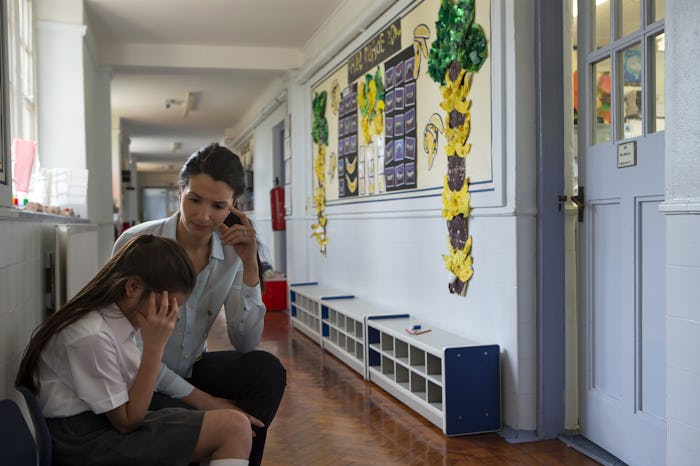Life

How To Confront A Bully's Parents, Which Is Rarely Easy
One of the hardest days in a parent's life is finding out that their child is being bullied. Your heart aches for your kid, and the hurt quickly turns into anger. You do everything in your power to stop yourself from marching right over and setting the little bully straight yourself. But, then you remember that you are a grown up, and things need to be handled in a mature fashion. Bullying is a serious issue, and many experts have discussed how to confront a bully's parents so that the problem can be resolved quickly and as free of drama as possible.
If you don't know the offending child's parents, and the bullying is taking place on school grounds, you might consider contacting the school about the problem first. They are trained to handle these kinds of situations, and may be able to resolve it without creating additional tension between the two families. But, if you do know the parents personally, it may be a good idea to discuss the problem with them directly and avoid getting the school involved.
Here are some ways to confront the parents of your child's bully in a way in which they will be receptive to your concerns.
1Don't Vague-Book
According to author and educator Rosalind Wiseman, you should avoid posting about the bullying on social media, even in generalities, especially if you're friends with the parents of your child's bully. It can come across as an underhanded way to turn other parents against the bullying child and family. Imagine how you would want another parent to handle it if the tables were turned.
2Initiate A Face-To-Face Conversation
If you're like me and hate confrontation, you might be inclined to send the parent an email or text about the situation, but the experts at Boys Town recommended talking to the parent face to face. WebMD also suggested talking to the parents in private to minimize potential public embarrassment.
3Don't Judge The Parents
It's easy to assume that the apple doesn't fall far from the tree, but try not to judge the bully's parents before talking to them. Wiseman warned in WebMD that people can tell when you are coming into the conversation already harboring a negative opinion of them, and it won't go well.
4Choose Your Words Wisely
Avoid using the word "bully" because that is the quickest way for the parents to become defensive and stop being receptive to your concerns. No one wants to hear their child called a name, even if it accurately describes their behavior. Instead, Boys Town suggested explaining the specific acts of bullying and how they made your child feel. Also, it helps to use names rather than "your kid" or "my kid." For example, "Joey came to me and told me he was upset because Sam has been calling him some nasty names on the playground every day."
5Be Prepared For Any Reaction
There are parents who are genuinely mortified at their child's behavior and will make sure to intervene right away. Then, there are the parents whose first response is to belittle you or your child. They will downplay the events and turn your child's hurt feelings into a character flaw. They will try to make you feel like a helicopter parent for even approaching them about "kid stuff."
6Give Them A Chance To Respond
Sometimes, things are not exactly how they seem. The "bully" may be struggling with a social or developmental delay, and the parent may not be aware of how their child interacts with other kids when they are not around. This doesn't excuse inappropriate behavior, and your child's feelings still count, but it may not be as cut and dry as the typical mean kid on the playground. There is also the chance that your child did something (intentionally or not) to illicit a negative reaction from the other child, and chose to keep that part of the story to himself.
7Don't Be Surprised If Things Don't Change
It would be fantastic if one chat with a bully's parent could solve the problem in its tracks. But, kids who bully often have issues that can't be solved overnight. Wiseman suggested letting the parents know after a certain number of days if things haven't changed, and being clear that you really want them to speak to their child.
8Talk To Your Child's School
If the bullying is happening on school grounds and you haven't had any luck with the parents, education consultant Annie Fox, M.Ed. told Babble that this is the time to go to the school counselor. Most schools have a zero tolerance policy on bullying, and they will make sure to figure out a way to solve the problem.